WCC Live Blog
--- DAY 3 ---
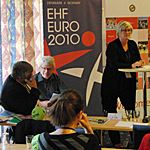 (12:20 hrs) The Conclusions for the Future were summarised by Helga Magnusdottir and Allan Lund. The focus now is to pass on the experiences made and to find clever solutions for implementing the new thoughts on women's handball. Thank you all for joining us!
(12:20 hrs) The Conclusions for the Future were summarised by Helga Magnusdottir and Allan Lund. The focus now is to pass on the experiences made and to find clever solutions for implementing the new thoughts on women's handball. Thank you all for joining us!
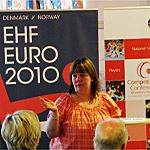 (11:54 hrs) The three separate groups have returned to the plenum after fulfilling their tasks in isolated break-out rooms. Now for the third and last time, the results of the workshops are presented by a spokesperson of each group. After that not only "Topic 3 - The Girl on the Road" finishes but also the 2010 Women's Handball Competition Conference will end. After lunch the participants will return home and bring with them new aspects on women's handball.
(11:54 hrs) The three separate groups have returned to the plenum after fulfilling their tasks in isolated break-out rooms. Now for the third and last time, the results of the workshops are presented by a spokesperson of each group. After that not only "Topic 3 - The Girl on the Road" finishes but also the 2010 Women's Handball Competition Conference will end. After lunch the participants will return home and bring with them new aspects on women's handball.
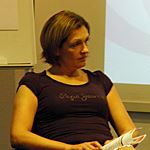 (10:57 hrs) Rima Sypkus, EHF Competitions: "As a parent and a former player I can say that the most important thing is combining school and handball on a club level. I was lucky, because in Austria there was a project 'Career after Career' that helped me in the transition from sports to work life."
(10:57 hrs) Rima Sypkus, EHF Competitions: "As a parent and a former player I can say that the most important thing is combining school and handball on a club level. I was lucky, because in Austria there was a project 'Career after Career' that helped me in the transition from sports to work life."
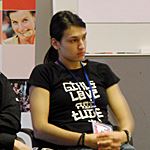 (10:51 hrs) Cristina Neagu, National player Romania: "When you are young it's all about entertainment. So Street Handball is ideal for kids."
(10:51 hrs) Cristina Neagu, National player Romania: "When you are young it's all about entertainment. So Street Handball is ideal for kids."
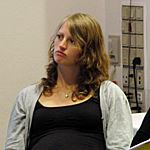 (10:43 hrs) Lene Lund, player Denmark: "I started handball quite late but as I have seen, I can confirm that Street Handball is the future. Regarding education it is very important that you study while you are active. In Denmark we have an organisation that helps athletes in this matter."
(10:43 hrs) Lene Lund, player Denmark: "I started handball quite late but as I have seen, I can confirm that Street Handball is the future. Regarding education it is very important that you study while you are active. In Denmark we have an organisation that helps athletes in this matter."
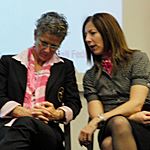 (10:35 hrs) Nathalie Janvier, FFR (French Federation of Rugby): "There are few females in the administration of Rugby. We are trying to involve former players on all levels: coaching, leadership. And we also have a project to involve parents in bringing children into Rugby."
(10:35 hrs) Nathalie Janvier, FFR (French Federation of Rugby): "There are few females in the administration of Rugby. We are trying to involve former players on all levels: coaching, leadership. And we also have a project to involve parents in bringing children into Rugby."
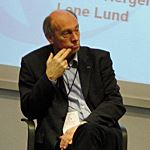 (10:30 hrs) Hans Holdhaus, IHF MC/IMSB: "I believe that the best coaches should work with the youngsters. It happens that children get reduced adult's trainings while they have their own specific needs."
(10:30 hrs) Hans Holdhaus, IHF MC/IMSB: "I believe that the best coaches should work with the youngsters. It happens that children get reduced adult's trainings while they have their own specific needs."
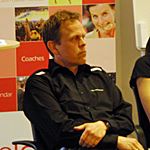 (10:27 hrs) Thorir Hergeirson, Coach of Norway's National Team: "It is a usual problem that coaches in kid's handball copy the trainings from adult handball. Children need special games and Street Handball is the right way to do it."
(10:27 hrs) Thorir Hergeirson, Coach of Norway's National Team: "It is a usual problem that coaches in kid's handball copy the trainings from adult handball. Children need special games and Street Handball is the right way to do it."
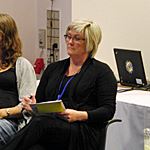 (10:25 hrs) The podium discussion is on, starting with Helga Magnusdottir, responsible for Women's Competitions at the EHF Competitions Commission: "Street Handball is a very good initiative and a very well thought out game. We need to find a balance between sports, studying and making friends through handball."
(10:25 hrs) The podium discussion is on, starting with Helga Magnusdottir, responsible for Women's Competitions at the EHF Competitions Commission: "Street Handball is a very good initiative and a very well thought out game. We need to find a balance between sports, studying and making friends through handball."
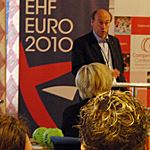 (10:13 hrs) Back in the plenum, Hans Holdhaus from IHF MC/IMSB talks about the medical aspects of women in sports: "Women and men are different in an abundance of details, analysing not only their body structure but also in their will to win. But it is possible to educate girls and boys the same between the age of 3-12 to use their bodies and develop basic motoric skills. In single disciplines - for instance in Judo - women and men have training sessions together. We should have thoughts whether that can be partly adapted to handball."
(10:13 hrs) Back in the plenum, Hans Holdhaus from IHF MC/IMSB talks about the medical aspects of women in sports: "Women and men are different in an abundance of details, analysing not only their body structure but also in their will to win. But it is possible to educate girls and boys the same between the age of 3-12 to use their bodies and develop basic motoric skills. In single disciplines - for instance in Judo - women and men have training sessions together. We should have thoughts whether that can be partly adapted to handball."
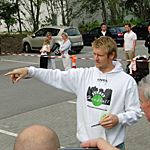
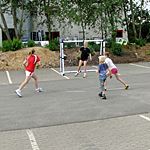
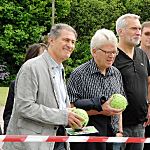 (09:54 hrs) Time for fresh air: The Women's Handball Competition's Conference moved outside to see a Demonstration of Street Handball. The presentation was held by Danish National Player Lasse Boesen who explained this easy to adapt learning game for the youth. Street Handball is played without physical impact with a soft ball and is aiming on practice and learning technical skills by having fun. Among the crowd was IHF President Dr. Hassan Moustafa.
(09:54 hrs) Time for fresh air: The Women's Handball Competition's Conference moved outside to see a Demonstration of Street Handball. The presentation was held by Danish National Player Lasse Boesen who explained this easy to adapt learning game for the youth. Street Handball is played without physical impact with a soft ball and is aiming on practice and learning technical skills by having fun. Among the crowd was IHF President Dr. Hassan Moustafa.
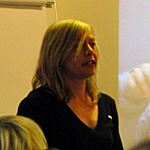 (09:17 hrs) As a representative of the youngest 75 year old - the Danish Handball Federation - Katrine Thoe Nielsen presented their ambitious project "Kvinde - Ta' del i spillet på toppen" (Women - be part of the top level game): "With this project, that has been going on for the last two years, we want to strenghten the role of women within Danish Handball. One goal is to have a minimum of 30% women in all boards and committees of the DHF. Our activities include spreading awareness by information, publishing articles on female role models, holding workshops, giving financial support and more. Diversity makes uns stronger!"
(09:17 hrs) As a representative of the youngest 75 year old - the Danish Handball Federation - Katrine Thoe Nielsen presented their ambitious project "Kvinde - Ta' del i spillet på toppen" (Women - be part of the top level game): "With this project, that has been going on for the last two years, we want to strenghten the role of women within Danish Handball. One goal is to have a minimum of 30% women in all boards and committees of the DHF. Our activities include spreading awareness by information, publishing articles on female role models, holding workshops, giving financial support and more. Diversity makes uns stronger!"
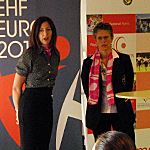 (08:59 hrs) After giving an overview over the organisational structure within European Rugby, Nathalie Janvier from FFR (French Federation of Rugby) and the assisting and translating Fiona Simoneau-Byrne from RCMN (Rugby Club de la Marine Nationale = French Navy Rugby) explained the reasons to the steadily increasing numbers of female Rugby players: "We stick to a plan with three factors promoting the sport which is carried out in schools. We start with branding 'Rugby Schools', the federation then provides assets for schools in order to make them educate Rugby, and we are training and forming coaches within the teaching staff. After that we do our best to enhance the status of our international players, in addition with strong partnerships, communication, promotion and media coverage."
(08:59 hrs) After giving an overview over the organisational structure within European Rugby, Nathalie Janvier from FFR (French Federation of Rugby) and the assisting and translating Fiona Simoneau-Byrne from RCMN (Rugby Club de la Marine Nationale = French Navy Rugby) explained the reasons to the steadily increasing numbers of female Rugby players: "We stick to a plan with three factors promoting the sport which is carried out in schools. We start with branding 'Rugby Schools', the federation then provides assets for schools in order to make them educate Rugby, and we are training and forming coaches within the teaching staff. After that we do our best to enhance the status of our international players, in addition with strong partnerships, communication, promotion and media coverage."
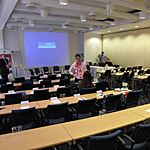 (08:30 hrs) After a very nice but also late night at the celebration of the 75th anniversary of the Danish Handball Federation, the breakfast buffet was just right to set the mood for the next conference part. Today the conference will focus on "Topic 3 - The Girl on the Road". The opener is going to held by the 'Rugby Ladies', which of course was breakfast talk topic number one.
(08:30 hrs) After a very nice but also late night at the celebration of the 75th anniversary of the Danish Handball Federation, the breakfast buffet was just right to set the mood for the next conference part. Today the conference will focus on "Topic 3 - The Girl on the Road". The opener is going to held by the 'Rugby Ladies', which of course was breakfast talk topic number one.
--- DAY 2 ---
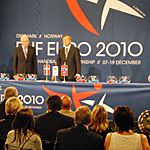 (17:06 hrs) The draw event is taking place, the participants have reserved seats before the stage. The results of the draw can be found here. After the end of the game they will transfer to the 75th anniversary celebrations of the Danish Handball Federation in Nyborg.
(17:06 hrs) The draw event is taking place, the participants have reserved seats before the stage. The results of the draw can be found here. After the end of the game they will transfer to the 75th anniversary celebrations of the Danish Handball Federation in Nyborg.
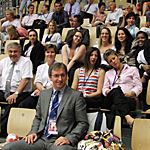 (16:22 hrs) The participants are enjoying the friendly game between the two nothern European rivals. In the meantime the stage for the draw event - which is built up behind a goal - is in its last preparations.
(16:22 hrs) The participants are enjoying the friendly game between the two nothern European rivals. In the meantime the stage for the draw event - which is built up behind a goal - is in its last preparations.
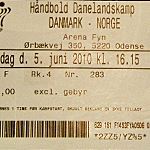 (15:02 hrs) After finishing the second bullet point "Topic 2 - The Brand Women's Handball from Global Marketer's View" it is now time for the participants of the Women's Handball Competitions Conference to see some of the sport in action. Therefore the group will travel to Odense's Arena Fyn to witness a friendly game between the National Teams of Denmark and Norway. These are the hosting nations of the EHF EURO 2010 which will take place in December. In the half-time break the Final Tournament Draw will take place to find the four Groups for the Preiminary Round. Some members of the conference are involved in the draw procedure.
(15:02 hrs) After finishing the second bullet point "Topic 2 - The Brand Women's Handball from Global Marketer's View" it is now time for the participants of the Women's Handball Competitions Conference to see some of the sport in action. Therefore the group will travel to Odense's Arena Fyn to witness a friendly game between the National Teams of Denmark and Norway. These are the hosting nations of the EHF EURO 2010 which will take place in December. In the half-time break the Final Tournament Draw will take place to find the four Groups for the Preiminary Round. Some members of the conference are involved in the draw procedure.
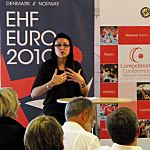 (14:51 hrs) The three separate groups have returned to the plenum after fulfilling their tasks in isolated break-out rooms. Now for the second time today, the results of the workshops are presented by a spokesperson of each group.
(14:51 hrs) The three separate groups have returned to the plenum after fulfilling their tasks in isolated break-out rooms. Now for the second time today, the results of the workshops are presented by a spokesperson of each group.
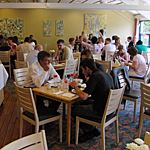 (14:09 hrs) After finishing the workshops in the three isolated groups in the break-out rooms, the hard work is taking a short break. The participants can finally enjoy the delicious Danish buffet in the lunchbreak. Right afterwards the groups will present their archievements.
(14:09 hrs) After finishing the workshops in the three isolated groups in the break-out rooms, the hard work is taking a short break. The participants can finally enjoy the delicious Danish buffet in the lunchbreak. Right afterwards the groups will present their archievements.
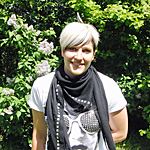 (13:41 hrs) While the three working groups are digging into the topic, German National Player and Champions League winner with Viborg, Anja Althaus, took the time to comment on the Women's Handball Competitions Conference: "This is a great idea which ensures that Nations can exchange experience and develop new ideas. Some ideas are quite spectacular, some I believe are rather for youth handball than for grown up women. Marketingwise we know that we are on a good way, as there is broad interest in the sport. It is crucial to take advantage of that interest and to produce more media coverage. I really hope that the EHF will push Women's top level handball more in the future."
(13:41 hrs) While the three working groups are digging into the topic, German National Player and Champions League winner with Viborg, Anja Althaus, took the time to comment on the Women's Handball Competitions Conference: "This is a great idea which ensures that Nations can exchange experience and develop new ideas. Some ideas are quite spectacular, some I believe are rather for youth handball than for grown up women. Marketingwise we know that we are on a good way, as there is broad interest in the sport. It is crucial to take advantage of that interest and to produce more media coverage. I really hope that the EHF will push Women's top level handball more in the future."
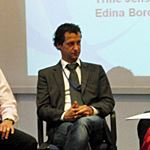 (12:59 hrs) Marc Rapparlié, CEO of Global MMK: "Culture differences still remain, even within Europe. The National Federations will have to develop the tools that work for them as individuals. It's up to the National Federations / Associations to take the opportunities provided and really work with them."
(12:59 hrs) Marc Rapparlié, CEO of Global MMK: "Culture differences still remain, even within Europe. The National Federations will have to develop the tools that work for them as individuals. It's up to the National Federations / Associations to take the opportunities provided and really work with them."
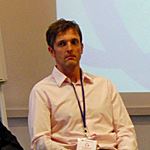 (12:51 hrs) Patrik Holmgren, Infront Sport & Media AG's Associate Director of Summer Sports: "Having a great personality is great for your sport. However, you should not rely on the 'fancy'. In order to get to the stage there needs to be a solid and functionable foundation. More thrill and more attractivity will go towards reaching new target groups."
(12:51 hrs) Patrik Holmgren, Infront Sport & Media AG's Associate Director of Summer Sports: "Having a great personality is great for your sport. However, you should not rely on the 'fancy'. In order to get to the stage there needs to be a solid and functionable foundation. More thrill and more attractivity will go towards reaching new target groups."
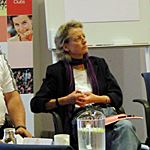 (12:45 hrs) Karen Espelund, First Vice President of UEFA's Women's Commitee: "Although the heroines help, it is not 100% necessary if the necessary and required effort is put in on a grass roots level. Basically, those working at the grass root's level have the opportunity to force associations into action. Associations have to give schools ideas and opportunities and by doing so making it easier for physical education teachers. But not all physical education teachers are open to handball."
(12:45 hrs) Karen Espelund, First Vice President of UEFA's Women's Commitee: "Although the heroines help, it is not 100% necessary if the necessary and required effort is put in on a grass roots level. Basically, those working at the grass root's level have the opportunity to force associations into action. Associations have to give schools ideas and opportunities and by doing so making it easier for physical education teachers. But not all physical education teachers are open to handball."
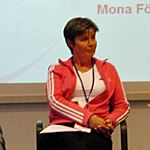 (12:40 hrs) Mona Förström, EHF Delegate from Finland and EHF Lecturer for Refereeing: I agree that starting with grass roots is the way to go or development. Also in Finland it is hard to get spectators to the hall. But my greatest interest here is that we get more female referees. At the end of the day only female referees should officiate female games. The EHF needs to make a decision on timing, when we can start with the introduction of that."
(12:40 hrs) Mona Förström, EHF Delegate from Finland and EHF Lecturer for Refereeing: I agree that starting with grass roots is the way to go or development. Also in Finland it is hard to get spectators to the hall. But my greatest interest here is that we get more female referees. At the end of the day only female referees should officiate female games. The EHF needs to make a decision on timing, when we can start with the introduction of that."
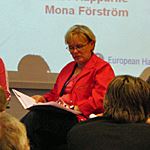 (12:37 hrs) Janka Stasova, EHF ECA and Secretary General of the Slovakian Handball Federation: "Women's handball is extremely popular in Slovakia, even though we are a very small federation. Our focus is mainly on getting the attention of local fans. But not only getting them interested, we also need to keep them interested, that is very important. So I believe that Slovakian women's handball needs heroines."
(12:37 hrs) Janka Stasova, EHF ECA and Secretary General of the Slovakian Handball Federation: "Women's handball is extremely popular in Slovakia, even though we are a very small federation. Our focus is mainly on getting the attention of local fans. But not only getting them interested, we also need to keep them interested, that is very important. So I believe that Slovakian women's handball needs heroines."
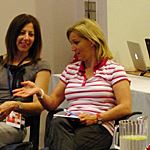 (12:33 hrs) The second podium discussion is going on. It was opened by Edina Boros, Manager of the French National Team: "In France men's and women's handball are equal. Both are getting the same media attention, the same amount of financial fundings and are equal in human resources. Nevertheless the Women's Competition Conference is a good step for developing women's handball, so I am planning to take these ideas with me for further discussions in France with our National Federation."
(12:33 hrs) The second podium discussion is going on. It was opened by Edina Boros, Manager of the French National Team: "In France men's and women's handball are equal. Both are getting the same media attention, the same amount of financial fundings and are equal in human resources. Nevertheless the Women's Competition Conference is a good step for developing women's handball, so I am planning to take these ideas with me for further discussions in France with our National Federation."
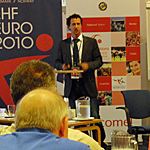 (12:24 hrs) The CEO of Global MMK, Marc Rapparlié, speaks about media, marketing and communication: "As a marketer in women's handball as in any sports, it makes life easier if you are able to work with icons, so called testimonials. Unfortunately it is impossible to just create a testimonial. Still, it is crucial to think what is needed to create one. There are tasks for the athletes themselves, the clubs, the National Federations and of course the media."
(12:24 hrs) The CEO of Global MMK, Marc Rapparlié, speaks about media, marketing and communication: "As a marketer in women's handball as in any sports, it makes life easier if you are able to work with icons, so called testimonials. Unfortunately it is impossible to just create a testimonial. Still, it is crucial to think what is needed to create one. There are tasks for the athletes themselves, the clubs, the National Federations and of course the media."
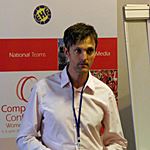 (11:52 hrs) Patrik Holmgren, Infront Sport & Media AG's Associate Director of Summer Sports: "Looking at the development of media figures, in general women's handball shows very positive and growing figures. Then again the market is very much locally fragmented, some countries are so much more interested than others. We believe that the potential drivers for the success of sports and events are a healthy financial basis, clever marketing vehicles and of course national heroines and role models. In all aspects we demand a maximum of professional delivery."
(11:52 hrs) Patrik Holmgren, Infront Sport & Media AG's Associate Director of Summer Sports: "Looking at the development of media figures, in general women's handball shows very positive and growing figures. Then again the market is very much locally fragmented, some countries are so much more interested than others. We believe that the potential drivers for the success of sports and events are a healthy financial basis, clever marketing vehicles and of course national heroines and role models. In all aspects we demand a maximum of professional delivery."
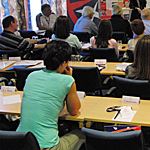 (11:40 hrs) The second big block has started. The Women's Handball Competitions Conference now is focussing on "Topic 2 - The Brand Women's Handball from Global Marketer's View".
(11:40 hrs) The second big block has started. The Women's Handball Competitions Conference now is focussing on "Topic 2 - The Brand Women's Handball from Global Marketer's View".
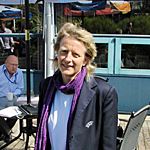 (11:26 hrs) An interesting overview is presented by Karen Espelund, First Vice President of UEFA's Women's Commitee: "At UEFA we have a clear policy for strengthening the women's game. We see it as extremely important to build competitions, on pro and amateur level but also for the youth. Football frankly has come further in development than handball has. We also have an international calender that synchronises club and national competitions. Additionally we give a recommendation to work with grass roots, and build competitions for the youth, locally, regionally and internationally. A Star System has been introduced, nations qualify for up to six stars from UEFA which are given for talent programs, recruitment, development and more. Another big step was taken 10 years ago when we decided that in female games we only allow female officials and referees. That had a consequence, we needed to recruit and to educate a lot of new staff. But that is the way to go, and nowadays we have a strong fundament."
(11:26 hrs) An interesting overview is presented by Karen Espelund, First Vice President of UEFA's Women's Commitee: "At UEFA we have a clear policy for strengthening the women's game. We see it as extremely important to build competitions, on pro and amateur level but also for the youth. Football frankly has come further in development than handball has. We also have an international calender that synchronises club and national competitions. Additionally we give a recommendation to work with grass roots, and build competitions for the youth, locally, regionally and internationally. A Star System has been introduced, nations qualify for up to six stars from UEFA which are given for talent programs, recruitment, development and more. Another big step was taken 10 years ago when we decided that in female games we only allow female officials and referees. That had a consequence, we needed to recruit and to educate a lot of new staff. But that is the way to go, and nowadays we have a strong fundament."
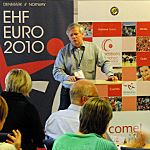 (11:09 hrs) The three separate groups have fulfiled their tasks in isolated break-out rooms and after a short cooffe break returned to the plenum. Now the results of the workshops are presented by a spokesperson of each group. It turns out that many new points of view are presented. As a result to Allan Lund's provocative opener, the participants do not agree in all points.
(11:09 hrs) The three separate groups have fulfiled their tasks in isolated break-out rooms and after a short cooffe break returned to the plenum. Now the results of the workshops are presented by a spokesperson of each group. It turns out that many new points of view are presented. As a result to Allan Lund's provocative opener, the participants do not agree in all points.
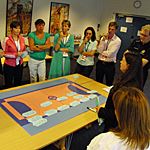
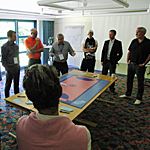
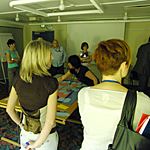 (10:21 hrs) Three working groups in separate break-out rooms are discussing "Topic 1 - A stylish and attractive game".
(10:21 hrs) Three working groups in separate break-out rooms are discussing "Topic 1 - A stylish and attractive game".
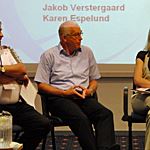 (10:05 hrs) A flourishing introducion by the Chairman of the EHF Competitions Commission, Jan Tuik: I believe that our regulations need to be looked at. We have too many rules, this makes it difficult for not only players but also spectators. Rules can be, have been and should be adapted to individual situations without being apprehensive. I also believe that there is too much aggression in the sport, we will need to reduce that. Maybe pink floors are a simple but effective way to archieve that."
(10:05 hrs) A flourishing introducion by the Chairman of the EHF Competitions Commission, Jan Tuik: I believe that our regulations need to be looked at. We have too many rules, this makes it difficult for not only players but also spectators. Rules can be, have been and should be adapted to individual situations without being apprehensive. I also believe that there is too much aggression in the sport, we will need to reduce that. Maybe pink floors are a simple but effective way to archieve that."
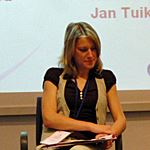 (09:52 hrs) The referee's turn: Croatian EHF referee Helena Crnojevic emphasises on the social aspect: "In women's handball not everybody tries to be the legend or the icon. It is more about the team and that is a very important part of the game. An observation as a referee is that there is much more passive play in women's handball than in men's. Women don't seem to know how to handle passive play. Oh, and by the way I would love the pink balls!"
(09:52 hrs) The referee's turn: Croatian EHF referee Helena Crnojevic emphasises on the social aspect: "In women's handball not everybody tries to be the legend or the icon. It is more about the team and that is a very important part of the game. An observation as a referee is that there is much more passive play in women's handball than in men's. Women don't seem to know how to handle passive play. Oh, and by the way I would love the pink balls!"
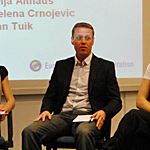 (09:45 hrs) Champions League winners Viborg's Coach Jakob Vestergaard: "First of all: women's handball is already the best team sport in the world. I like the idea of playing three times 20 minutes. But the ball size should not be changed. The best handball players in the world don't have a problem with the ball, but there would be difficulties in controlling the ball if we change the size. That is insignificant." The audience seemed to agree.
(09:45 hrs) Champions League winners Viborg's Coach Jakob Vestergaard: "First of all: women's handball is already the best team sport in the world. I like the idea of playing three times 20 minutes. But the ball size should not be changed. The best handball players in the world don't have a problem with the ball, but there would be difficulties in controlling the ball if we change the size. That is insignificant." The audience seemed to agree.
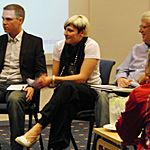 (09:37 hrs) The podium discussion is going on. Anja Althaus, German National player, is quite clear: "I don't like the pink balls. Don't like the idea at all. This is handball, a fast and tough sport. It's not ballet!" Point taken.
(09:37 hrs) The podium discussion is going on. Anja Althaus, German National player, is quite clear: "I don't like the pink balls. Don't like the idea at all. This is handball, a fast and tough sport. It's not ballet!" Point taken.
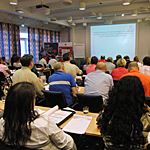 (09:26 hrs) Allan Lund is the Master of Provocation. After starting with excessive interaction with the audience, he brings up ideas like more different ball sizes, girls playing with pink balls, only have 5 players on the court and a total of 10 per team, substitutions only being allowed in ball posession, match time three times 20 minutes or the idea that at least 50% of the team officials have to be female. These wild ideas will now lead the participants to the panel discussion.
(09:26 hrs) Allan Lund is the Master of Provocation. After starting with excessive interaction with the audience, he brings up ideas like more different ball sizes, girls playing with pink balls, only have 5 players on the court and a total of 10 per team, substitutions only being allowed in ball posession, match time three times 20 minutes or the idea that at least 50% of the team officials have to be female. These wild ideas will now lead the participants to the panel discussion.
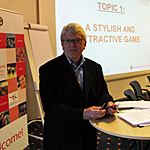 (09:03 hrs) The conference starts with a fanfare. EHF Methods Commissions member for Development, Allan Lund: "Now is the time for innovative development. No excuses and delays are acceptable. Thus I am going to ask you questions around the product 'women's handball'. It's time for changes and it is our duty to make women's handball the best team sport in the world."
(09:03 hrs) The conference starts with a fanfare. EHF Methods Commissions member for Development, Allan Lund: "Now is the time for innovative development. No excuses and delays are acceptable. Thus I am going to ask you questions around the product 'women's handball'. It's time for changes and it is our duty to make women's handball the best team sport in the world."
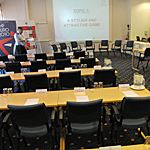 (08:39 hrs) Ready, steady... everything is set up for the beginning of the conference. Most of the participants already had their breakfast in the Danish morning sun and are now settling for the opening. At 9:00 the first topic of the day "A stylish and attractive game" will be tackled with speaker Allan Lund talking about his visions for the future.
(08:39 hrs) Ready, steady... everything is set up for the beginning of the conference. Most of the participants already had their breakfast in the Danish morning sun and are now settling for the opening. At 9:00 the first topic of the day "A stylish and attractive game" will be tackled with speaker Allan Lund talking about his visions for the future.
--- DAY 1 ---
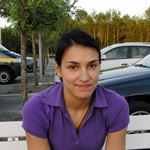 (21:37 hrs) Taking part at the conference also is the 'World’s Best Rookie of the Year 2009', Romanian left back Cristina Neagu: "Ideas are good. I enjoy very much that people are thinking about the development of women's handball. Maybe by this way more people can see the beauty of the sport and the feminine side to it. That could also lead to more media coverage, like the men already have. That was my thought when I watched the EHF FINAL4 last weekend, that was such a wow! I myself will try to have a lucky hand at the draw tomorrow and try to produce exciting groups, so I will do my bit for more media coverage."
(21:37 hrs) Taking part at the conference also is the 'World’s Best Rookie of the Year 2009', Romanian left back Cristina Neagu: "Ideas are good. I enjoy very much that people are thinking about the development of women's handball. Maybe by this way more people can see the beauty of the sport and the feminine side to it. That could also lead to more media coverage, like the men already have. That was my thought when I watched the EHF FINAL4 last weekend, that was such a wow! I myself will try to have a lucky hand at the draw tomorrow and try to produce exciting groups, so I will do my bit for more media coverage."
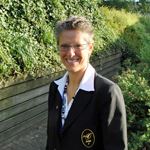 (19:39 hrs) Different sports can give different perspective, as Nathalie Janvier from FFR (French Federation of Rugby) proves: "Since Rugby and Handball are quite similar from a sportive point of view, I am happy to get to know the structure of another European Federation and am looking forward to exchange inspiring practice and experience. Despite differences of the sport, the rules, the media coverage and some objectives, we still have one main objective in common: to promote top level feminine sports."
(19:39 hrs) Different sports can give different perspective, as Nathalie Janvier from FFR (French Federation of Rugby) proves: "Since Rugby and Handball are quite similar from a sportive point of view, I am happy to get to know the structure of another European Federation and am looking forward to exchange inspiring practice and experience. Despite differences of the sport, the rules, the media coverage and some objectives, we still have one main objective in common: to promote top level feminine sports."
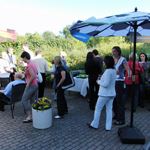 (19:05 hrs) After the official opening the participants can now enjoy the warm Danish evening sun and start to get to know each other in small personal discussion groups before the speeches, panel discussions, workshops and open discussions start tomorrow morning.
(19:05 hrs) After the official opening the participants can now enjoy the warm Danish evening sun and start to get to know each other in small personal discussion groups before the speeches, panel discussions, workshops and open discussions start tomorrow morning.
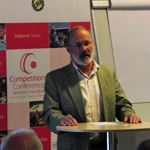 (19:00 hrs) Tor Lian was followed by Jean Brihault, EHF Vice President: "I would like to reiterate the fact that the European Handbal Federation is placing great value and great expectations on sport-political solutions arising from the discussions taking place over the weekend."
(19:00 hrs) Tor Lian was followed by Jean Brihault, EHF Vice President: "I would like to reiterate the fact that the European Handbal Federation is placing great value and great expectations on sport-political solutions arising from the discussions taking place over the weekend."
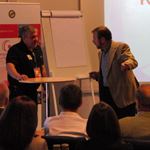 (18:49 hrs) The conference was officially opened by Tor Lian, EHF President, who was very pleased to have so many people at the conference: "This weekend is about innovation. At this very special occasion here in Denmark, we want to take women's handball to the next level. The focus is on building the brand of women's handball. I am content to see that we are all ready to get down to serious work."
(18:49 hrs) The conference was officially opened by Tor Lian, EHF President, who was very pleased to have so many people at the conference: "This weekend is about innovation. At this very special occasion here in Denmark, we want to take women's handball to the next level. The focus is on building the brand of women's handball. I am content to see that we are all ready to get down to serious work."
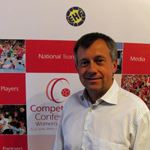 (18:37 hrs) Michael Wiederer, EHF Secretary General, explains the next steps: "The 2006 Youth Competitions Conference and the 2008 Men's Competitions Conference gave strong input to strengthen the international team competitions and has created a platform for competitions for clubs and National Teams. At this Conference we shall - in collaboration with international specialists - give a boost to the development of women's handball. We are positive that the workshops and panel discussions will produce findings that will be further discussed when the Executive Commitee meets next week."
(18:37 hrs) Michael Wiederer, EHF Secretary General, explains the next steps: "The 2006 Youth Competitions Conference and the 2008 Men's Competitions Conference gave strong input to strengthen the international team competitions and has created a platform for competitions for clubs and National Teams. At this Conference we shall - in collaboration with international specialists - give a boost to the development of women's handball. We are positive that the workshops and panel discussions will produce findings that will be further discussed when the Executive Commitee meets next week."
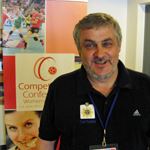 (18:19 hrs) The particiants are arriving at the Conference Hotel. As presenter of the conference Helmut Höritsch, EHF CAN, expects productive days: "Over this weekend dedicated to women's handball - including the 75th anniversary of the Danish Handball Federation and the Final Tournament Draw of the EHF EURO 2010 - we chose to invite the National Federations, external experts and our stakeholders in order to creatively share our thoughts on the development of the wonderful sport of women's handball. It is crucial that we find the best way to prepare a competitive product for the market."
(18:19 hrs) The particiants are arriving at the Conference Hotel. As presenter of the conference Helmut Höritsch, EHF CAN, expects productive days: "Over this weekend dedicated to women's handball - including the 75th anniversary of the Danish Handball Federation and the Final Tournament Draw of the EHF EURO 2010 - we chose to invite the National Federations, external experts and our stakeholders in order to creatively share our thoughts on the development of the wonderful sport of women's handball. It is crucial that we find the best way to prepare a competitive product for the market."































































































